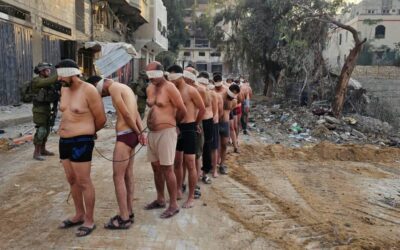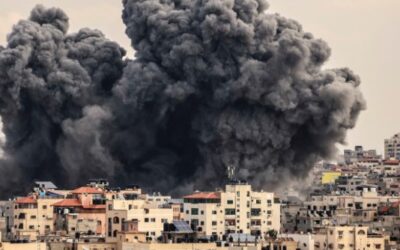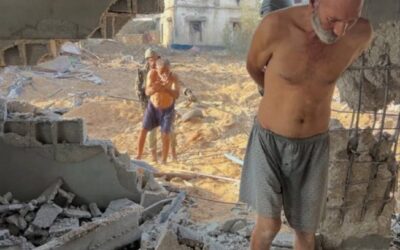In Gaza, families plead for help after two infants die awaiting permits for medical treatment in Israel
 Two infants have died in the Gaza Strip awaiting permits for medical treatment in Israel, a tragedy that Palestinians anxiously fear could expand in the coming weeks. Permits for Gaza’s sickest patients to receive treatment in Israel and the West Bank ended abruptly on May 19 when Palestinian President Mahmoud Abbas announced an end to coordination with Israel. It was a protest move against Israel’s plans to annex parts of the West Bank in July.
Two infants have died in the Gaza Strip awaiting permits for medical treatment in Israel, a tragedy that Palestinians anxiously fear could expand in the coming weeks. Permits for Gaza’s sickest patients to receive treatment in Israel and the West Bank ended abruptly on May 19 when Palestinian President Mahmoud Abbas announced an end to coordination with Israel. It was a protest move against Israel’s plans to annex parts of the West Bank in July.
The first child died last week, nine-month-old Omar Yaghi who awaited permission to exit Gaza for surgery for a cardiac abnormality. On Monday, Anwar Harb died nine days after his birth, also from a cardiac disease.
On Wednesday the United Nations Special Envoy to the Middle East Nikolay Mladenov said both Israel and the Palestinian Authority were responsible for “the ending of civilian coordination” and Omar Yaghi’s death.
“Already, a [nine]-month-old infant has lost his life due to this situation,” Mladenov said. “Surely there must be a red line when it comes to the lives of children.”
Jehad Yaghi, Omar’s grandfather said “he would have survived if he had his remaining two surgeries which were supposed to be on May 21 at Sheba hospital in Israel.”
“The lives of the patients are sacred and should not be manipulated for political situations. Omar would have been in his family’s arms by now if he had undergone surgery when it was scheduled. The doctors confirmed as much, however, he passed. An angel who had a charming smile, he passed away only because he was sick in Gaza,” he said.
Yaghi displayed referral reports from doctors and old permit forms he filed for Omar’s last four surgeries. Tearfully, he added, “He was a very beautiful child and smiled every time we carried him and hugged him. He was a little angel and now he has gone to heaven.”
Omer was born with congenital malformations in his heart. Two hours after his birth he was moved to the intensive care unit at the Abdel Aziz Al-Rantisi Hospital for children. When it became clear that no hospital in Gaza was capable of performing the surgery he needed, his family then secured permits for four different surgeries in Israel.
“The family was holding out hope according to feedback from doctors that we had received, that he would make it,” the Yaghi said. “His condition was treatable if things had gone as planned. It is inhumane to subject patients to political differences.”
“Patients in need of treatment are not enemies, especially children,” the grandfather said.
The Palestinian Authority said it would cease coordinating with Israel and froze the Palestinian Civil Affairs Committee, the body that is responsible for filing the medical permit requests to Israeli army’s civil administration for patients living in Gaza. As well, the PA said it would stop paying the medical bills for Palestinians already in Israel undergoing care.
The Coordinator for Government Activities in Territories, or COGAT, Israel’s military civilian administrator confirmed over social media it was no longer receiving permits from the PA.
“In this period there are delays and disturbances in the process of transferring requests for permits for Gaza residents to enter Israel. The disturbances are the result of the PA Civil Committee’s decision to stop handling requests [for permits] from the Gaza Strip and to transfer them to us,” COGAT wrote on Facebook, reported the Times of Israel.
Some Palestinians urgently reached out to the Red Cross and Physicians for Human Rights imploring the aid agencies to file permit requests. A few were successful, but it is still unclear if the majority of Palestinians who had surgeries or chemotherapy scheduled in Israel were successful.
According to the World Health Organization before the pandemic began over 1,750 patients from Gaza submitted permit applications each month for treatment in Israeli and West Bank hospitals each month. Data from the Israeli human rights group Gisha shows prior to March, close to 1,500 Palestinians left Gaza each month to access treatment. After the outbreak began the number plummeted to 200. June’s numbers are expected to be a few dozen at most.
“Almost a third of applications are for cancer patients; others require specialized surgeries, diagnostic imaging, cardiology, or other services otherwise unavailable,” the WHO reported last week. “Overall, this group of patients is very sick, with their probability of survival at six months from first permit application less than 90%.”
Fifteen-day-old Bayan Kahlout’s family reached out to the Red Cross and on Monday learned that their permit request was filed for care at Al Makassed hospital in East Jerusalem. She already missed her first appointment, which was scheduled for four days ago.
“We knew if we kept silent she would pass away, so we started doing every possible thing to get her transferred for treatment,” her uncle Hadi Kahlout said. “We posted her status and photo on social media, we called the Red Cross all the time, we asked them to find a way to help Bayan before it is too late.”
“The Red Cross informed us on Monday that it could manage to transfer her to Israel, they got an urgent permit due to Bayan worsening condition. But by Monday evening Bayan was not entering the hospital.” Delays at the Erez checkpoint, the exit from Gaza to Israel prevented their trip, “but maybe she will be there by tonight?” Kahlout continued.
Other Palestinian in Gaza are desperate to resume regular treatment for conditions that cannot be cared for in Gaza. Fayez Abu Shurbi, 55, began chemotherapy for acute myeloid leukemia last November. At the time he was diagnosed he was working in construction and had inexplicable bouts of fatigue.
“Finding out that I had this serious illness turned my life upside down. I started going to An-Najah hospital in Nablus city in the West Bank, many times,” Abu Shurbi said.
His first round of chemotherapy lasted four months and appointments were inconsistent. Each time he was treated, he needed a new exit permit.
“Sometimes I got the permit, other times I do not. My health was getting weaker and weaker, I left my job and my life dedicated my life to advocating for my treatment,” he said.
His last treatment, a bone marrow transplant, was initially set for mid-March. Yet, once the coronavirus pandemic reached the region, the hospital canceled his operation. Two additional rescheduled dates for the surgery also came and passed, but this time because the PA froze the permit office.
“All the while my condition was getting worse,” Abu Shurbi said. “The new appointment is on July 7, and I do not know if I’m going to have my treatment or not.”
Distributed by PAJU (Palestinian and Jewish Unity)
PAJUMONTREAL.ORG/EN







